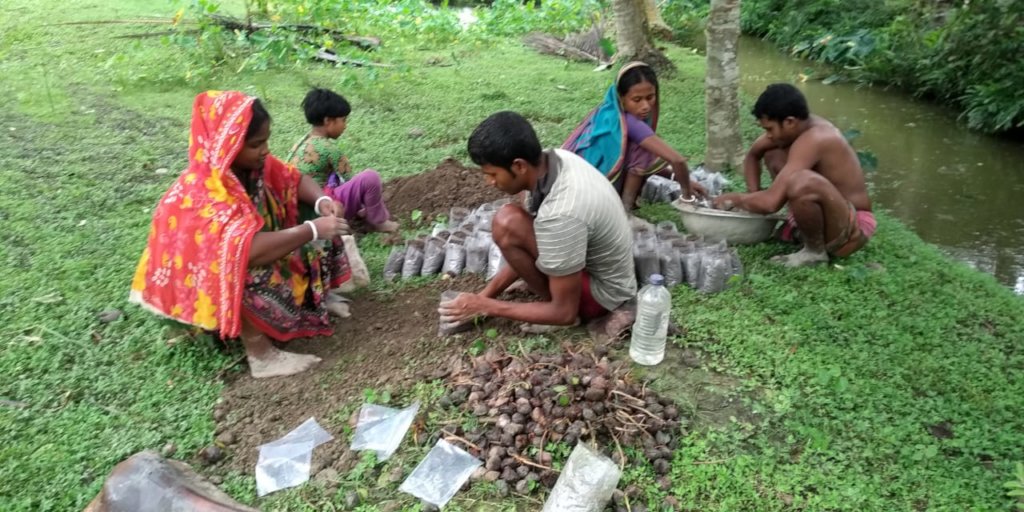By Md. Maksudur Rahman | Project Leader
Conservation intervention are usually successful and sustainable when local communities are on board, fully understand the value of their participation and long term benefits. So, Sundarbans women members of the Sundarbans region of Bangladesh have stand for conserving their mangrove ecosystem. They produced more than 50 thousand mangrove saplings for mangrove regeneration activities. Specially they produced Nypa fruticans, Xylocarpus mekongensis, Bruguiera gymnorhiza, Heritiera fomes, Sonneratia caseolaris, Sonneratia apetala etc. mangrove species.
The Sundarbans coastal communities are now producing mangrove saplings for their alternate livelihood. 5 women and their family members are working extremely hard to produce mangrove saplings in their 5 mangrove nurseries at Paschim Dhangmari village of Banishanta union under Dacope sub district of Khulna district. The mangrove nurseries provide them economic benefit and also play an important role for regeneration of mangrove ecosystem. Mangrove saplings are must for mangrove regeneration.
Mother role is the key actor for conserving our Nature
Dear All,
Greeting from Bangladesh Environment and Development Society (BEDS)!
Hope you are safe and sound in this pandemic.
It is the extreme that mangrove forests of the tropical coasts are among the most important and productive ecosystems on earth. Among other things, their gigantic carbon storage potential means that they play an enormously important role in stabilizing the world's climate and protecting the coasts. Over half of the world's mangrove forests have been lost in the last century, many of them have lost due to aquaculture, agriculture, development and every year 2.1% mangroves are decreasing.
Sundarbans is the single largest mangrove forest in the world. Sundarbans provides significant on-going ecological processes as it represents the process such as monsoon rains, flooding, delta formation, tide influence, plant colonization and diversified habitat and breeding place for flora and fauna. Sundarbans is at serious risk of losing its origin from the world due to diverse human activities. As a result, shortage of Mangrove and climate change impact together accelerates the volume of vulnerability of the coastal area especially river erosion.
Take care and stay safe.
Maksud
----------------------------------
Md. Maksudur Rahman
Chief Executive
Bangladesh Environment and
Development Society (BEDS)
House No. 6/3, Road No 01
Prantika R/A, Nirala, Khulna- 9100, Bangladesh
Tel: + 88 041 721123
Mob: + 88-01712 868 004
email: <info@bedsbd.org> <bedsbd@gmail.com> <chief@bedsbd.org>
Skype name: beds20111
Connect with us:
Project reports on GlobalGiving are posted directly to globalgiving.org by Project Leaders as they are completed, generally every 3-4 months. To protect the integrity of these documents, GlobalGiving does not alter them; therefore you may find some language or formatting issues.
If you donate to this project or have donated to this project, you can receive an email when this project posts a report. You can also subscribe for reports without donating.
Support this important cause by creating a personalized fundraising page.
Start a Fundraiser